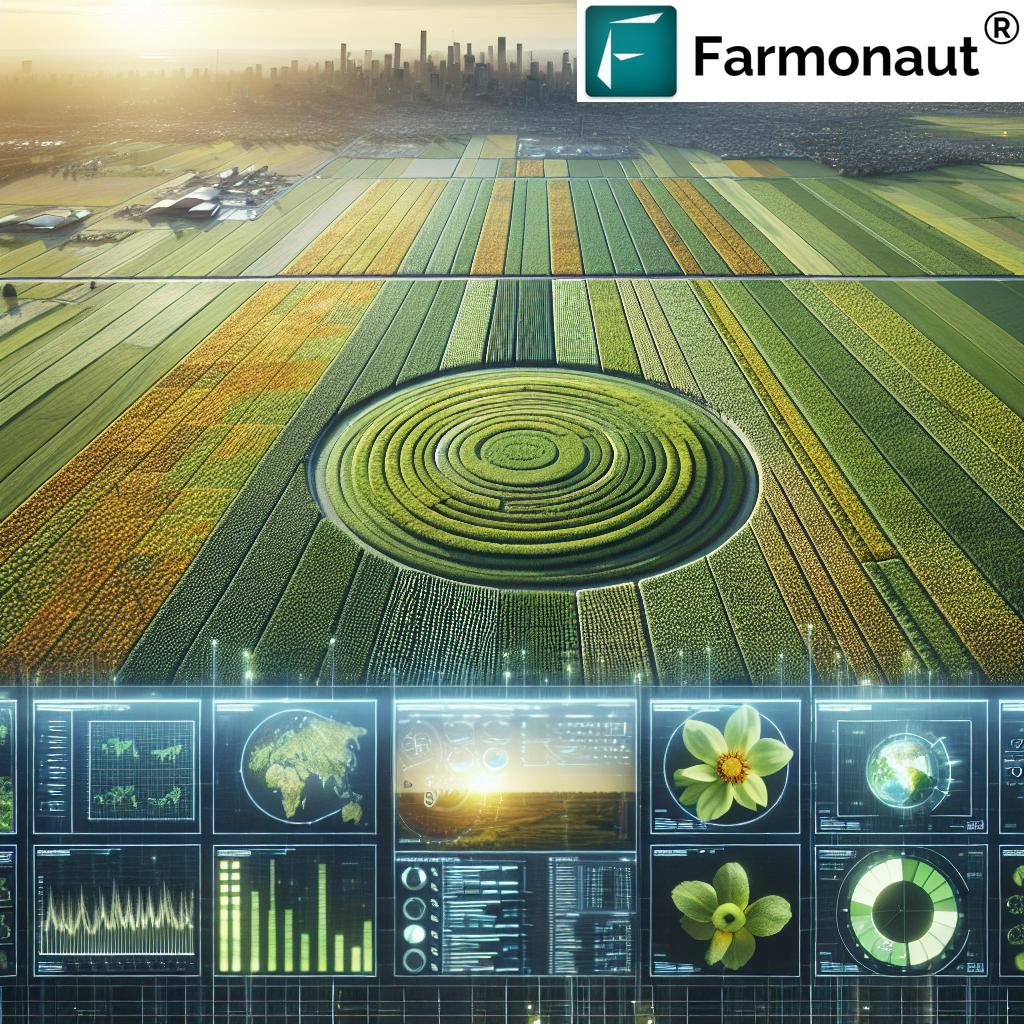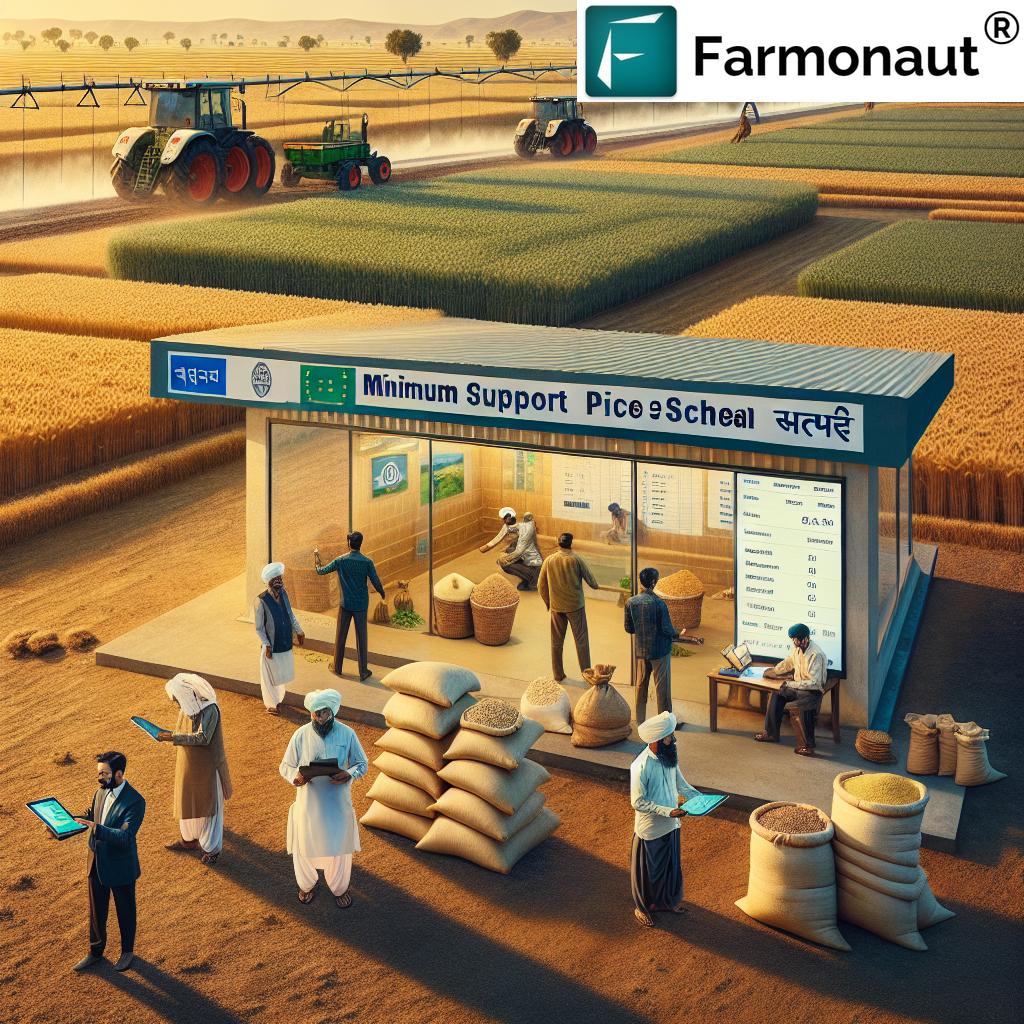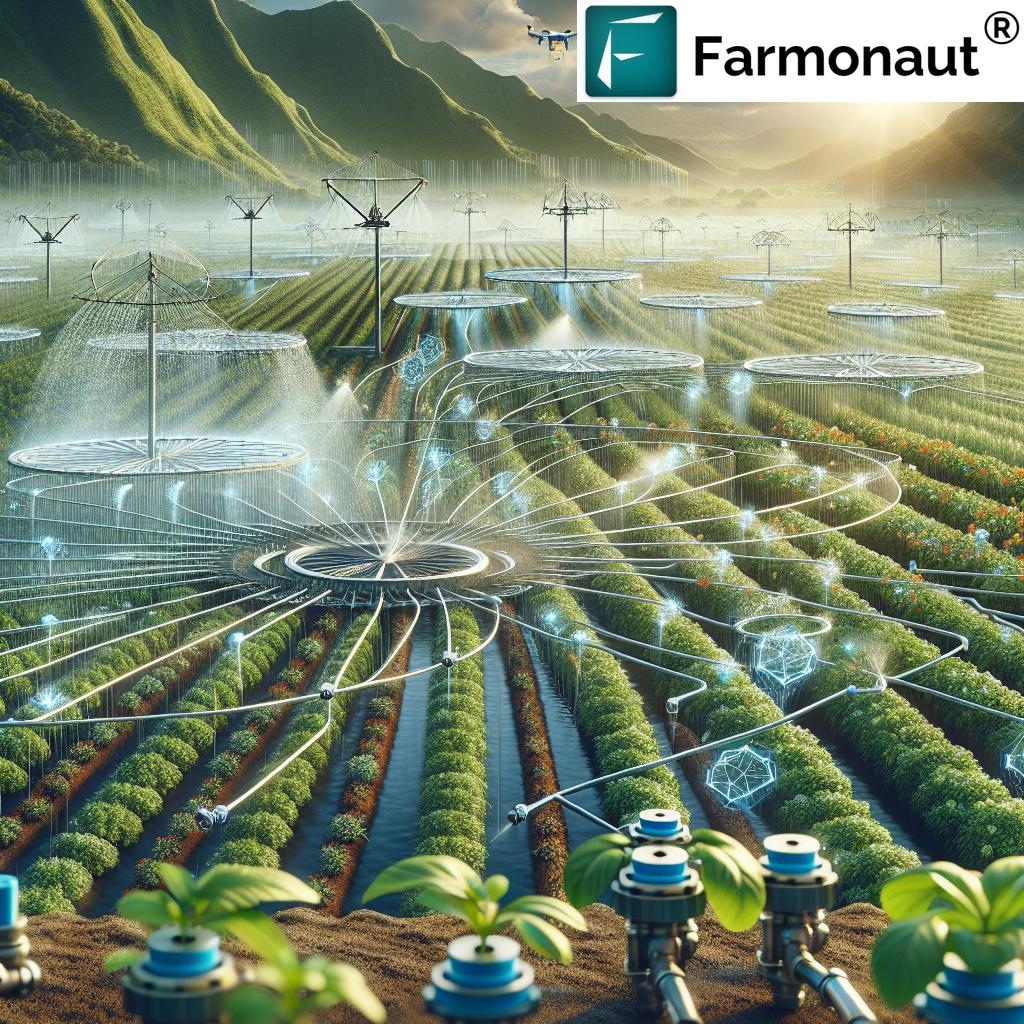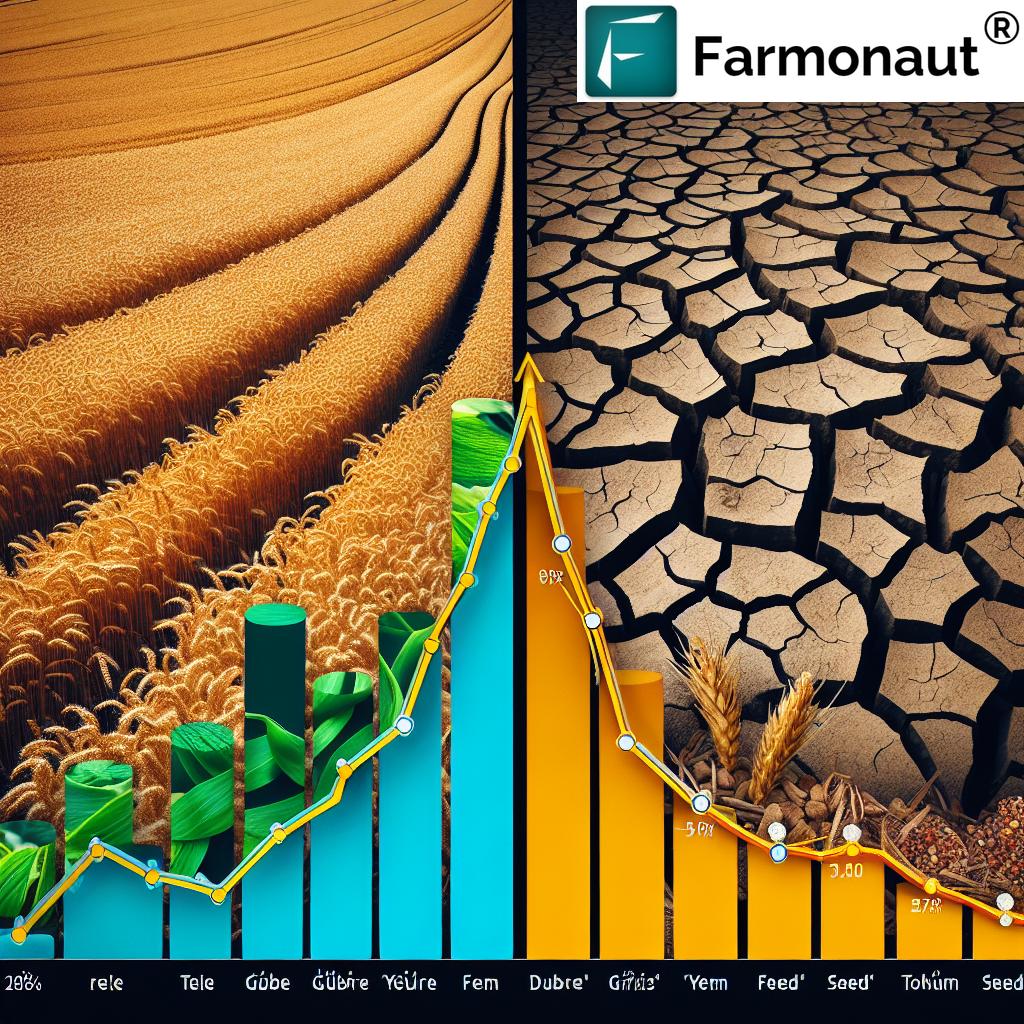Revolutionizing Indian Agriculture: Farmonaut’s Tech-Driven Solutions for Sustainable Farming and Soil Health
In the face of pressing global issues like climate change and soil degradation, the future of sustainable agriculture and rural livelihoods hangs in the balance. As we navigate these challenges, innovative solutions and tech-driven approaches are emerging as beacons of hope. In this comprehensive exploration, we’ll delve into the transformative power of sustainable farming practices, soil restoration techniques, and cutting-edge agricultural technology solutions that are reshaping the landscape of Indian agriculture.
At the forefront of this agricultural revolution is Farmonaut, a pioneering agritech company that’s making waves with its satellite-based farm management solutions. By integrating advanced technology with traditional farming wisdom, Farmonaut is paving the way for a more sustainable and productive future for Indian farmers.
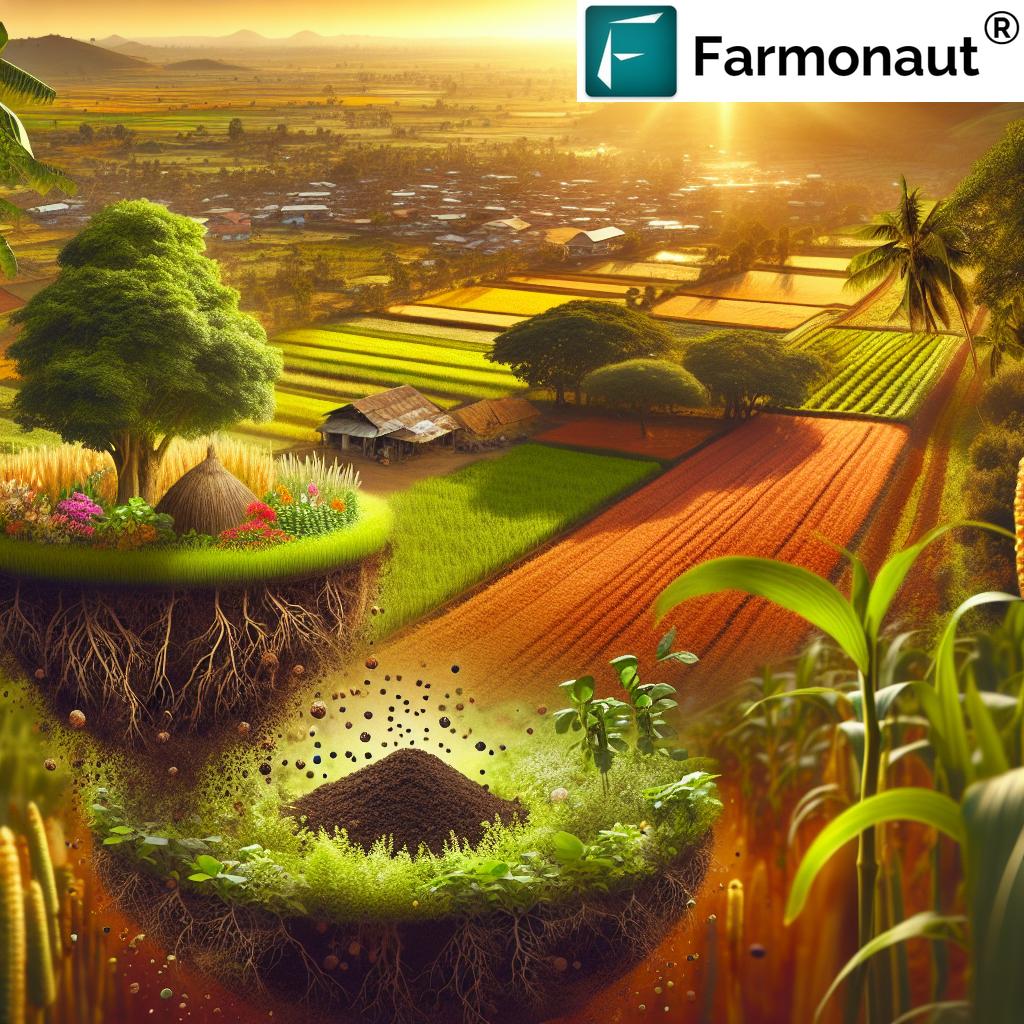
The Urgency of Climate Change Mitigation in Farming
Climate change poses an existential threat to agriculture, with rising temperatures, erratic rainfall patterns, and extreme weather events jeopardizing crop yields and food security. As stewards of the land, we must adopt proactive measures to mitigate these impacts and build resilience in our farming systems.
“Agroforestry can sequester up to 5 times more carbon than conventional agriculture, making it a powerful climate change mitigation tool.”
One of the most promising approaches to climate change mitigation in farming is agroforestry. This integrated land-use system combines trees and shrubs with crops or livestock, creating a symbiotic relationship that benefits both the environment and farmers. Agroforestry not only sequesters carbon but also enhances biodiversity, improves soil health, and provides additional income streams for farmers through timber, fruits, and other tree products.
Soil Restoration Techniques: The Foundation of Sustainable Agriculture
Healthy soil is the bedrock of sustainable agriculture. Unfortunately, decades of intensive farming practices have led to widespread soil degradation, threatening the very foundation of our food systems. To reverse this trend, we must prioritize soil restoration techniques that rebuild soil organic matter, enhance microbial activity, and improve overall soil health.
- Cover cropping: Planting cover crops during fallow periods protects the soil from erosion, adds organic matter, and improves soil structure.
- Composting: Incorporating compost into the soil enhances its nutrient content and water-holding capacity.
- Reduced tillage: Minimizing soil disturbance helps preserve soil structure and beneficial microorganisms.
- Crop rotation: Alternating crops helps break pest cycles and balances nutrient demands on the soil.
By implementing these soil restoration techniques, farmers can create a resilient foundation for sustainable agriculture practices that will benefit generations to come.
Harnessing the Power of Organic Farming Methods
Organic farming methods offer a holistic approach to agriculture that prioritizes soil health, biodiversity, and ecological balance. By eschewing synthetic pesticides and fertilizers, organic farmers create healthier ecosystems that are more resistant to pests and diseases.
“Organic farming methods can increase soil organic matter by up to 28%, significantly improving soil health and crop yields.”
Some key organic farming methods include:
- Biological pest control: Using natural predators and beneficial insects to manage pest populations.
- Green manures: Planting nitrogen-fixing crops to enrich the soil naturally.
- Companion planting: Strategically pairing crops to enhance growth and deter pests.
- Organic fertilizers: Utilizing compost, animal manure, and other natural inputs to nourish the soil.
By adopting these organic farming methods, Indian farmers can improve soil health, reduce their environmental impact, and produce nutrient-dense crops that command premium prices in the market.
Farmonaut: Pioneering Agricultural Technology Solutions
In the realm of agricultural technology solutions, Farmonaut stands out as a game-changer for Indian farmers. By leveraging satellite imagery, artificial intelligence, and machine learning, Farmonaut provides farmers with real-time insights into their crops’ health, soil moisture levels, and potential pest issues.
Key features of Farmonaut’s platform include:
- Satellite-based crop health monitoring
- AI-powered advisory system (Jeevn AI)
- Blockchain-based product traceability
- Fleet and resource management tools
- Carbon footprint tracking
These innovative tools empower farmers to make data-driven decisions, optimize resource use, and improve overall farm productivity. By democratizing access to precision agriculture, Farmonaut is helping level the playing field for small and medium-sized farmers across India.
Explore Farmonaut’s cutting-edge solutions:
Eco-Friendly Farming Practices: A Path to Sustainability
As we strive for a more sustainable future, eco-friendly farming practices are gaining traction among Indian farmers. These practices aim to minimize environmental impact while maintaining or improving agricultural productivity.
- Water conservation: Implementing drip irrigation and rainwater harvesting systems to optimize water use.
- Integrated pest management: Combining biological, cultural, and chemical controls to manage pests effectively while minimizing pesticide use.
- Renewable energy adoption: Utilizing solar panels and biogas digesters to reduce reliance on fossil fuels.
- Agroecological approaches: Designing farming systems that mimic natural ecosystems to enhance resilience and productivity.
By embracing these eco-friendly farming practices, Indian farmers can reduce their environmental footprint while improving the long-term sustainability of their operations.
Crop Diversification Strategies: Enhancing Resilience and Income
Crop diversification is a crucial strategy for building resilience in agricultural systems and improving farmers’ economic stability. By moving away from monocultures and embracing a diverse range of crops, farmers can:
- Spread risk across multiple crop types
- Improve soil health through varied nutrient demands
- Enhance biodiversity and natural pest control
- Access multiple markets and income streams
Farmonaut’s satellite-based crop monitoring and AI advisory system can play a vital role in supporting crop diversification efforts. By providing detailed insights into soil conditions, climate patterns, and market trends, Farmonaut empowers farmers to make informed decisions about which crops to grow and when to plant them.
For developers interested in integrating Farmonaut’s powerful tools into their own applications, check out the Farmonaut API and API Developer Docs.
Rural Sustainable Development: Empowering Communities
Sustainable agriculture is not just about farming practices; it’s also about fostering thriving rural communities. Rural sustainable development initiatives aim to improve the quality of life for farmers and their families while preserving natural resources for future generations.
Key aspects of rural sustainable development include:
- Capacity building: Providing training and education to farmers on sustainable practices and new technologies.
- Infrastructure development: Improving rural roads, storage facilities, and market access.
- Diversification of rural economies: Promoting non-farm activities and value-added processing.
- Community-based natural resource management: Empowering local communities to manage their resources sustainably.
Farmonaut’s technology solutions can support these efforts by providing valuable data and insights to policymakers, NGOs, and community leaders working on rural development initiatives.
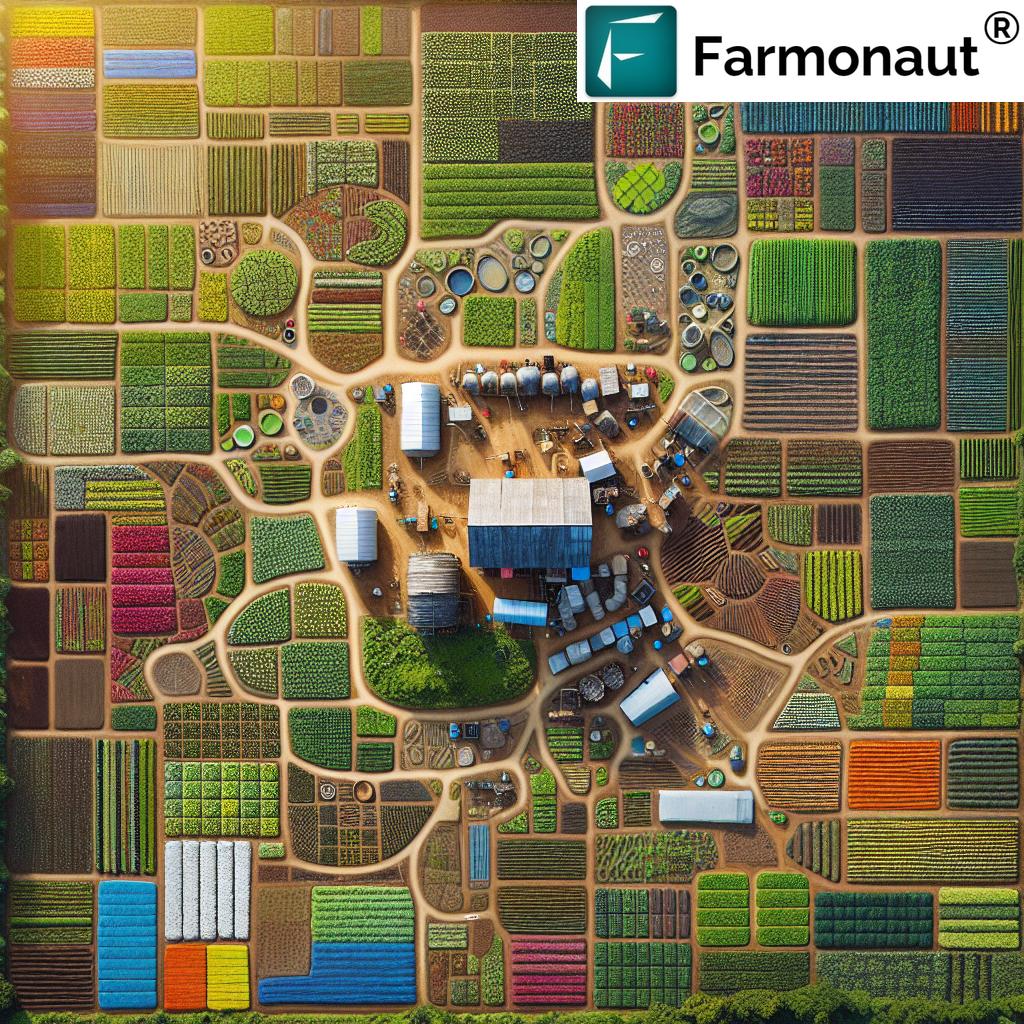
The Importance of Local Produce: Strengthening Food Systems
Promoting local produce is a crucial component of sustainable agriculture and rural development. By supporting local farmers and shortening supply chains, we can:
- Reduce food miles and associated carbon emissions
- Improve food freshness and nutritional value
- Strengthen local economies and food security
- Preserve regional food cultures and traditions
Farmonaut’s blockchain-based traceability solutions can play a vital role in promoting local produce by providing consumers with transparent information about the origin and journey of their food. This increased transparency can help build trust between farmers and consumers, fostering stronger local food systems.
Community-Based Approaches to Farming: Strength in Unity
Community-based approaches to farming can significantly enhance the sustainability and resilience of agricultural systems. By working together, farmers can:
- Share resources and knowledge
- Achieve economies of scale in purchasing inputs and marketing outputs
- Implement landscape-level conservation practices
- Build social capital and support networks
Farmonaut’s platform can support community-based farming initiatives by providing shared access to valuable data and insights, enabling farmers to make collective decisions based on real-time information about their crops and local conditions.
The Power of Dietary Changes: Consumer-Driven Sustainability
Consumer choices play a crucial role in shaping agricultural practices and food systems. By adopting more sustainable dietary habits, consumers can drive positive change in the farming sector. Some key dietary changes that can support sustainable agriculture include:
- Reducing meat consumption and embracing plant-based proteins
- Choosing locally grown, seasonal produce
- Supporting organic and regenerative farming practices
- Minimizing food waste through better planning and storage
As consumers become more conscious of their food choices, Farmonaut’s traceability solutions can provide the transparency needed to make informed decisions about the sustainability and origin of their food.
Breaking the Debt Cycle: Empowering Farmers Financially
One of the most pressing issues facing Indian farmers is the cycle of debt that often traps them in poverty. To break this cycle and create a more sustainable future for agriculture, we must focus on:
- Improving access to affordable credit and insurance
- Promoting financial literacy and farm management skills
- Developing alternative income streams through value-added processing and agritourism
- Strengthening farmer cooperatives and collective bargaining power
Farmonaut’s technology can support these efforts by providing farmers with data-driven insights that can improve their productivity and profitability, potentially reducing their reliance on high-interest loans.
Comparative Analysis of Sustainable Farming Practices
| Farming Practice | Climate Change Mitigation | Soil Health Improvement | Ecosystem Benefits | Economic Impact on Farmers |
|---|---|---|---|---|
| Agroforestry | High (5x carbon sequestration) | Significant improvement | Enhanced biodiversity | Diversified income streams |
| Organic Farming | Moderate to High | Up to 28% increase in soil organic matter | Improved soil biodiversity | Premium prices for produce |
| Crop Diversification | Moderate | Improved nutrient cycling | Increased resilience to pests | Reduced risk, stable income |
| Tech-Driven Solutions (Farmonaut) | Indirect (through optimization) | Data-driven soil management | Precision resource use | Increased productivity and efficiency |
| Community-Based Approaches | Variable | Collective soil conservation efforts | Landscape-level improvements | Shared resources, reduced costs |
Farmonaut Subscription Plans
To harness the power of Farmonaut’s innovative agricultural technology solutions, explore our flexible subscription plans tailored to meet the diverse needs of farmers, agribusinesses, and agricultural organizations:
Frequently Asked Questions (FAQ)
Q: How does Farmonaut’s technology help improve soil health?
A: Farmonaut’s satellite-based monitoring provides detailed insights into soil moisture levels and vegetation health. This data helps farmers make informed decisions about irrigation, fertilization, and crop rotation, ultimately leading to improved soil health over time.
Q: Can small-scale farmers benefit from Farmonaut’s solutions?
A: Absolutely! Farmonaut’s platform is designed to be accessible and affordable for farmers of all scales. By providing valuable insights without the need for expensive on-ground sensors, Farmonaut democratizes access to precision agriculture technologies.
Q: How does Farmonaut support sustainable farming practices?
A: Farmonaut’s AI-powered advisory system provides personalized recommendations for sustainable farming practices, such as optimal resource use and integrated pest management. Additionally, the platform’s carbon footprint tracking feature helps farmers monitor and reduce their environmental impact.
Q: Is Farmonaut’s technology applicable to all types of crops?
A: Farmonaut’s satellite-based monitoring and AI algorithms are designed to work with a wide range of crops. The system is continually updated to improve its accuracy and expand its crop coverage.
Q: How can I integrate Farmonaut’s data into my existing farm management systems?
A: Farmonaut offers API access, allowing developers and businesses to integrate its satellite and weather data into their own systems. This enables seamless integration with existing farm management tools and software.
Conclusion: A Sustainable Future for Indian Agriculture
As we face the challenges of climate change, soil degradation, and food security, the need for sustainable agriculture practices has never been more urgent. By embracing innovative solutions like those offered by Farmonaut, adopting eco-friendly farming methods, and prioritizing soil health, we can create a more resilient and productive agricultural sector in India.
The journey towards sustainable agriculture is a collective effort that requires the participation of farmers, consumers, policymakers, and technology providers. By working together and leveraging the power of cutting-edge agricultural technology solutions, we can build a future where farming is not only environmentally sustainable but also economically viable and socially responsible.
As we move forward, let’s continue to innovate, collaborate, and invest in the sustainable practices and technologies that will shape the future of Indian agriculture. Together, we can create a thriving agricultural ecosystem that nourishes both people and the planet for generations to come.












